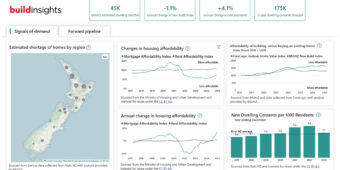Huge variation in consent Fees
18 Oct 2022, Industry News, News

A recent study by Te Waihanga/New Zealand Infrastructure Commission has uncovered large discrepancies in building consents fees across the country, but many BCAs question the findings
Data gathered from 51 of 67 councils showed that the medium fee to process a consent for a $350,000 build is $3,780 – although there is a standard deviation of $1,540.
For example, the total fee for a project between $100,000 and $499,999 is $4,982 in Auckland. Wellington City Council charges $1,253 for the same sized project, while Christchurch City Council charges $1,900 for a project valued between $300,000 and $500,000. In Queenstown, a building consent for a project of a similar value will set homeowners back $3,740.
The median fee for a $750,000 project is $4,376 with a standard deviation of $2,024.
Across those four councils, Auckland is the most expensive ($7,376), followed by Queenstown ($5,720). In Wellington, it costs $2,923.25 for a consent, while Christchurch costs just $2,500.
A spokesperson for Wellington City Council (WCC) said its fees could be lower than average due to the way the consents team is funded.
“Different council building consents departments may [or may not] receive rates funding to support its activities.
”Some councils may have their building consents teams solely processing and inspecting consents and therefore receive little or no funding. Others may have their building consents and building compliance functions operating in the same business unit and, due to the nature of this work, receive a portion of rates funding.”
How to keep costs down
WCC confirmed that its building consents department is 65% self-funded and 35% rates funded. The Council added that one way builders can keep costs down is to ensure applications are as thorough as possible.
“Should there be unclear information or missing information, officers will issue a request for information (RFI). Due to the large variation in the information RFIs could be asking for, assessing responses to these incurs an hourly charge. If applicants ensure they have a good and complete application, they can save costs by avoiding the RFI process.”
Queenstown Lakes District Council’s (QLDC) General Manager Planning and Development, Tony Avery said that consent fees need to be higher to cover the cost of processing.
“Every council takes a different approach to charging for building consent costs. In the Queenstown Lakes District we have a full ’user pays’ approach. The fee is based on the median cost of processing any application, with refunds for those applications processed in less time and extra charges for those that take longer.”
He added that Queenstown’s growth means costs will naturally be higher.
“Our district is experiencing high growth and high levels of consent applications (the fifth highest by volume in NZ) and hence requires a level of resourcing to match. Furthermore, labour costs are typically higher than the national average in the district and, like all councils across the country, there is a shortage of experienced building consent officers. QLDC uses a range of contractors (at a higher cost than internal staff) to ensure that our processing and inspection times are kept within acceptable limits.”
No correlation detected
The study found that there was little correlation between the size of the council and the fee to process a building consent, nor across six other variables: labour costs, consent volume, employee cost share, income from fees and a proxy variable for spatial competition facing councils.
“All councils are legally required to provide a similar service and prohibited from charging more than the cost to provide the service,” said the report. “While there are large variations between councils – some councils charge as little as $1,000, and others charge as much as $7,000 – this does not seem to be related to council size or any other variables we tested.”
However, Auckland Council questioned its finding.
“We would suggest that further analysis is likely to reveal that most of the figures attributed to other councils in the report will actually only reflect their respective deposit regime. This would explain why some councils’ charges appear so much lower than other councils performing the same work.”
Auckland Council added that its deposits are a good indication of what a final cost may be but said “the final figure may be slightly lower or higher”.
Christchurch City Council had the same concern, added Head of Building Consenting Robert Wright.
“The two figures identified [in the report] for Council are identified under the heading ‘Building Consent – deposit’ with a proviso that ‘actual costs will
be calculated at the time of the processing decision’.
Wright added that the report doesn’t clarify which councils subsidise the cost of consent processing by using ratepayer money, such as Wellington City Council, and which councils charge the full cost of processing the consent.
“Also, it is not clear what the consent fees include, for example do they include inspection costs, levies, network connection costs etc. Or even if they include GST,” he concluded.
High costs mean inefficient builds
Te Waihanga/New Zealand Infrastructure Commission Director of Economics Peter Nunns said it’s important to understand consent fees, especially if high costs are resulting in inefficient builds.
“The costs to consent and build infrastructure are rising. We’ve recently published other research showing that consenting costs for infrastructure projects are increasing, and availability of key materials like aggregates is increasingly constrained. This makes it difficult to deliver infrastructure efficiently. We need to address these types of systemic issues to get good value from infrastructure investment.”
“Successive governments have invested in infrastructure, but they could have got more from what they spent. To do better, we need to better understand cost performance and look for areas we can improve.”
Register to earn LBP Points Sign in



